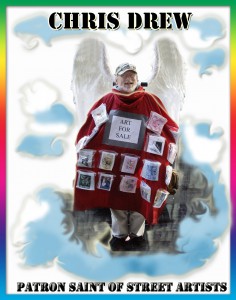 (From Chicago Independent Media Center) – Chris Drew, Chicago artist, activist, and free speech advocate, passed away on May 7. Drew was noted among the community of Chicago political activists for being a consistent presence at political activist rallies and events, particularly for his homemade silkscreened patches highlighting and bringing attention to a variety of political and social causes. He founded the Uptown Multi Cultural Art Center in the early 1990s and shared his silkscreening skills with others.
(From Chicago Independent Media Center) – Chris Drew, Chicago artist, activist, and free speech advocate, passed away on May 7. Drew was noted among the community of Chicago political activists for being a consistent presence at political activist rallies and events, particularly for his homemade silkscreened patches highlighting and bringing attention to a variety of political and social causes. He founded the Uptown Multi Cultural Art Center in the early 1990s and shared his silkscreening skills with others.
Drew gained national attention for his efforts for advancing free speech. He was arrested in December 2009 for challenging the peddlar’s license ordinance in the city of Chicago. The ordinance required street artists to register every month for a “free speech permit.” Those who “won” such permits were nevertheless restricted to be present to ten corners in the Loop.
Those efforts extended to challenging Illinois’ eavesdropping law, which forbid public recording of police on Illinois Streets. A suit against Drew by the State’s Attorney office was thrown out in March 2012, and on May 8, 2012, the day after Drew’s passing, the Seventh Circuit Court of Appeals in Chicago ruled in Drew’s favor, striking down the Illinois Eavesdropping Act.
Below is a reprint of a post on Chris Drew’s Facebook page.
====
This afternoon, May 7, 2012 artist Chris Drew passed away.
The most important thing to say is that Chris died as he lived, fighting all the way for the dispossessed and marginalized among us, for the right of artists to speak their mind and to survive. He died struggling to make sure the art patch project continues, and there are a number of artists beginning to organize to make sure the project does continue. He died urging that the legal battles he had entered not be dropped.
Before there was a national dialogue and a coherent cry on behalf of “the 99%,” Chris devoted his life to providing the artistic means for people to discover their creativity and to participate in the transformation of society. A long time colleague of Carlos Cortez, Chris lived the aphorism that Carlos was fond of telling as we sat around his dining room table: “Never become an artist to make a living. Become an artist to make a life!” While advocating for artists’ individual rights to make a living by their art, Chris never strayed from using art for change for all, and never left the section of society with and for whom he advocated.
Chris touched very many people in his journey. We will remember his strength, his audacity, his willingness to sacrifice, his ingenuity and persistence. We will remember his creativity, his art. As long as we are here, he is still here. Remember that he is still here, the next time you see another artist printing an art patch, when you see another art patch on a book bag or a jacket.
————
(From the editors of the Public i) Chris Drew, who was prosecuted under the Illinois Eavesdropping Law, making it a felony with a possible 15-year sentence to audio-record a police officer, most unfortunately passed away before the 7th Circuit U.S. Court of Appeals ruled that “the eavesdropping statute restricts a medium of expression-the use of a common instrument of commuication-and thus an integral step in the speech process. As applied here [in the Illinois statute], it interferes with the gathering and dissemination of information about government oficials performing their duties in public. Any way you look at it, the eavesdropping statute burdens speech and press rights and is subject to heightened First Amendment scrutiny.” The Appeals Court reversed the decision of a District Court that had upheld the law.
In 2004, local African American civil rights activists Patrick Thompson and Martel Miller were also charged under this Illinois eavesdropping law by then States Attorney John Piland after they had recorded stops made by the Champaign police. The charges were dropped by States Attorney Julia Reitz who was elected in 2004 and remains in that office today.
